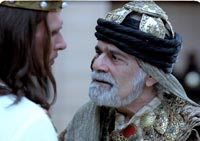The more I read my Bible, I can’t help but wonder what stories would work best on the silver screen. Retellings of Joshua, Daniel, Ruth … I’m still waiting on that epic, Braveheart-styled adaptation of the life of David that reduces the 1985 dud starring Richard Gere to a distant memory.
Esther wouldn’t necessarily be near the top of my list as an obvious choice. The biblical story behind the Jewish festival of Purim isn’t an overtly spiritual one on the surface, nor does it initially seem like it would translate well with the heavily historical exposition, building to an edict to wipe out God’s people in Persia, and then a climax that hinges on the pointing of a scepter. We tend to simplify Esther down to one courageous entrance, but there’s a lot more to her “call of destiny”—and perhaps too much more in the case of One Night with the King.

Based on Tommy Tenney’s novel Hadassah: One Night with the King, this film comes to us from Gener8xion Entertainment, which also brought us 1999’s The Omega Code. They’ve clearly learned a thing or two about production values since then, as One Night with the King may well be the best-looking movie from a Christian company to date, with sumptuous visuals that are both artistic and authentic.
Filmed in India, director Michael O. Sajbel and his team have recreated the Persian kingdom with the picturesque look of a fairy tale—or Naboo from the more recent Star Wars films. Sweeping camera work reminiscent of The Lord of the Rings trilogy gives us a bird’s eye view of the palace and the surrounding landscape. Beautiful costumes and set designs add to the look—Esther’s wedding day offers the same elegant pageantry that established Cecil B. DeMille during the golden age of Hollywood.
Praise is also deserved for the film’s impressive casting. Newcomer Tiffany Dupont is picture perfect as the female lead, exuding beauty, intelligence, and humility with a young woman’s charm that somehow seems sweetly appropriate for the biblical equivalent to Cinderella. Surrounding her is a strong and diverse array of male actors, none better than John Rhys-Davies (Raiders of the Lost Ark) with his warm portrayal of Esther’s cousin Mordecai. Luke Goss (Blade II) brings hunky royalty to the part of Xerxes, John Noble (The Return of the King) makes Prince Admantha as conniving as Denethor was, and James Callis (TV’s new Battlestar Galactica) has a hateful glower that brings Haman close to Shakespearean villainy. There’s also Omar Sharif in a small part as another princely advisor, and Peter O’Toole in a blink-and-you’ll-miss-it cameo as the prophet Samuel.

But Samuel is actually part of the reason One Night falls short—he’s completely unnecessary! It’s important to remember that the movie is an adaptation of a novelization of the book of Esther. A common mistake made in adapting any book (e.g the Harry Potter movies) is the attempt to transfer everything on the written page to film. The Lord of the Rings trilogy succeeded because the filmmakers discerned the difference between developments vital to the storytelling and details incidental to it—the essential vs. the extraneous.
Stephen Blinn’s screenplay for One Night is as complicated as Shakespeare crossed with The History Channel, constantly trying to explain the cultural and historical points without allowing the audience to comfortably sit back and enjoy the storytelling. You know you’re in for it when the movie relies on both narration (by Mordecai) and exposition in the dialogue to try and offer an Old Testament crash course. It ends up trying to say too much in too little time.
Though it’s important to know why Xerxes sought a new queen, can we truly appreciate an overlong scene of Queen Vashti’s refusal to appear at his banquet without fully understanding Persian royalty and tradition? An explanation of Haman’s personal vendetta against the Jewish people is certainly warranted, but do we really need a tangential prologue that hastily summarizes King Saul’s disobedience in 1 Samuel 15? And while it’s vital to explain Haman’s rise to power, do the intricate details of Admantha’s assassination plot add to the intrigue, or confuse the filmgoer unnecessarily? The script spends too much time trying to account for every detail about Haman’s success and hatred. Then, in order to drive the point home none too subtly, he’s given some anti-Semitic rants that echo Hitler, as well as a tribal symbol reminiscent of a swastika that identifies him as a descendent of Agag.

Character introduction is also awkward and subtle, making it hard to discern who’s essential to the story and who’s not. Yes, we need to establish the loving bond between Mordecai and Hadassah. No, we don’t need a potential romance between her and his underwritten family servant Jesse (Jonah Lotan), who later becomes a palace eunuch and ends up becoming the go-between for the two cousins.
The tricky thing about Esther’s story is finding a balance between oversimplifying and overcomplicating. The first half of this movie is essentially The Bachelor, as Esther is gradually schooled and groomed to earn the king’s favor. She first does so when she’s requested one evening to read the daily news to Xerxes, but then decides to recite the story of Jacob and Rachel instead—so much for keeping her heritage a low profile, eh?
Once she’s earned his heart and become queen, the challenge of the second half is to build tension, not only between Esther’s attempts to conceal her identity from an unsuspecting Haman, but also to sow seeds of doubt between her and Xerxes. If they’re too much in love, then there’s no suspense of whether he’ll spare her life in the scene’s pivotal scene. This undermines the film’s romantic themes somewhat, but nevertheless creates an intriguing relationship—two people devoted to each other, yet unable to be completely open with their lives.

All building to the well-known finales set in the throne room and the private banquet, both of which feel overly dramatized. After Esther’s long processional to the king’s throne, Xerxes extends his scepter at the last second … to deflect the sword of one of his palace guards. Later, when Esther reveals her identity, Scripture depicts Haman as fearful, begging her for his life. Here, he sneeringly mocks Esther and threatens her life, before Xerxes finally intervenes like George McFly from Back to the Future. Dramatic license is all well and good, but not when it contradicts key plot points. Much of the film’s drama also hinges on the secret of Esther’s necklace, a nice device except it gets lost, then found … then lost and found again. It all rings a little false with the melodrama.
I don’t want to sound too down on the filmmakers, though. This is difficult source material to adapt, which might explain why previous attempts to film it (most notably 1960 and 1999) have never quite gotten it right either. With One Night, they’ve made a commendable attempt at telling the story of a young woman who takes a leap of faith for her God and her people, and giving it sweeping production values to match.
But a good film still needs to communicate its story effectively, even one as familiar as this one is to Christians and Jews. If those who were raised on the story of Esther have as much trouble keeping up with this as I suspect they will, imagine how muddled One Night with the King will seem to anyone without the personal interest or acumen to invest in it. A tighter script could have made this a classic Bible epic.
Talk About It
Discussion starters- Esther was given the choice to do nothing and remain safe or risk everything to save her people. What would you have done? What can we learn from her example today in terms of sharing the gospel and serving others? How have things changed since then
- Not too unlike the story of Joseph, Esther rose from a peasant girl to royalty and played a pivotal role in saving her people. What does that say about God’s plans for each of our lives
- A single act of disobedience of Saul’s part caused the threat to the Jewish people, and another act of disobedience on Esther’s part saved them. What’s the difference between these two acts? What does it reveal about true authority
- Esther is described as one of the Bible’s more “secular” books with little religious value because it barely makes any reference to God. Do you agree with this? Is God absent from the story of Esther? What does it say about God’s role in our culture today—our art, our circumstances, our daily living?
The Family Corner
For parents to considerOne Night with the King is appropriately rated PG for violence, some sensuality, and thematic elements. We see the bloody aftermath of a battle from a distance, and a character is stabbed off-screen. The death of Esther’s parents in a flashback is so abstract, some might wonder what’s going on. Esther and Xerxes kiss on their wedding night—romantic, but chaste. The thematic elements probably refer to talk of assassination, execution, and genocide. None of the content is graphic by any means, but kids are likely to be bored by this talky and complex history lesson.
Photos © Copyright Gener8xion Entertainment/Fox Faith
Copyright © 2006 Christianity Today. Click for reprint information.
What Other Critics Are Saying
compiled by Jeffrey Overstreetfrom Film Forum, 10/19/06One Night With the King brings the story of Esther to life on a scale that will remind viewers of big screen biblical classics like The Ten Commandments. But does director Michael O. Sajbel’s film do justice to this beloved Old Testament story?
Is Stephan Blinn’s screenplay faithful to Scripture—or to the Tommy Tenney novel of the same title, which varies from the Bible story on some significant points?
Is Tiffany Dupont up to the challenge of portraying this complex character?
Christian film critics are coming to different conclusions.
The story of Esther could certainly be made into a great film someday, says Steven D. Greydanus (Decent Films). “One Night with the King is not that film. In a number of ways, it’s not even that story.”
Greydanus says the film has “a distinctly made-for-TV vibe,” and while he’s impressed with some of the casting, that’s about all. He says the script is “home-video hackneyed rather than silver-screen sophisticated,” and compares the romantic scenes between Xerxes and Esther to “a smitten schoolboy mooning over the head cheerleader.”
Finally, he notes that, while the novel “takes significant liberties with the biblical story,” the film departs from the Bible story even further.
Cliff Vaughn (Ethics Daily) says, “Three factors make One Night unsatisfying: the loosey-goosey script, some spotty acting and an ill-conceived musical score.”
Matt Page (BibleFilms blog) observes, “It’s a far better effort than anyone who watched [the filmmakers’] previous effort (The Omega Code) would have expected. This is one of the most visually impressive epics in years. … Ultimately though, even the most impressive visuals in the world cannot compensate for poor acting. … Sadly, the acting side of things is let down, badly, by poor performances by Luke Goss and Tommy ‘Tiny’ Lister as Xerxes and Hagai respectively.” He also faults the script, and concludes that the movie is “a mixed affair.”
Steven Isaac (Plugged In) seems as impressed with what the movie doesn’t do than what it does. He says it “soars far more often than it stumbles. While actors’ accents are all over the map and the story feels too dense to follow in spots, the action and intrigue is undeniably exciting and compelling—without ever resorting to gratuitous gore, violence, foul language or sexual situations.”
“One Night With the King is worth seeing just for the palace, effects, music score, and acting,” says Lisa Rice (Crosswalk), “but the true takeaway is the story.”
But she could have done without so much attention on the plight of the young eunuchs, whose involvement in the story “competes with the inspirational lessons. … “
And Elliott Ryan (CBN) says, “While the film does not follow the biblical narrative completely faithfully, the film does a great job of communicating the heart and message of the historical account.”
Mainstream critics aren’t very impressed. Josh Bell (Las Vegas Weekly) asks, “Dear Lord, why must Your most ardent followers unleash such bad movies in Your name? Surely, as our Creator, You wish for us to have better entertainment than the cut-rate fare that passes for faith-based film?” But Joe Leydon (Variety) says it’s “a surprisingly satisfying attempt to revive the Old Hollywood tradition of lavishly appointed Biblical epics aimed at mainstream audiences.”
from Film Forum, 11/30/06 Sister Rose Pacatte F.S.P. (Eye on Entertainment) calls it “overly costumed, unevenly acted and ideologically flawed.”












